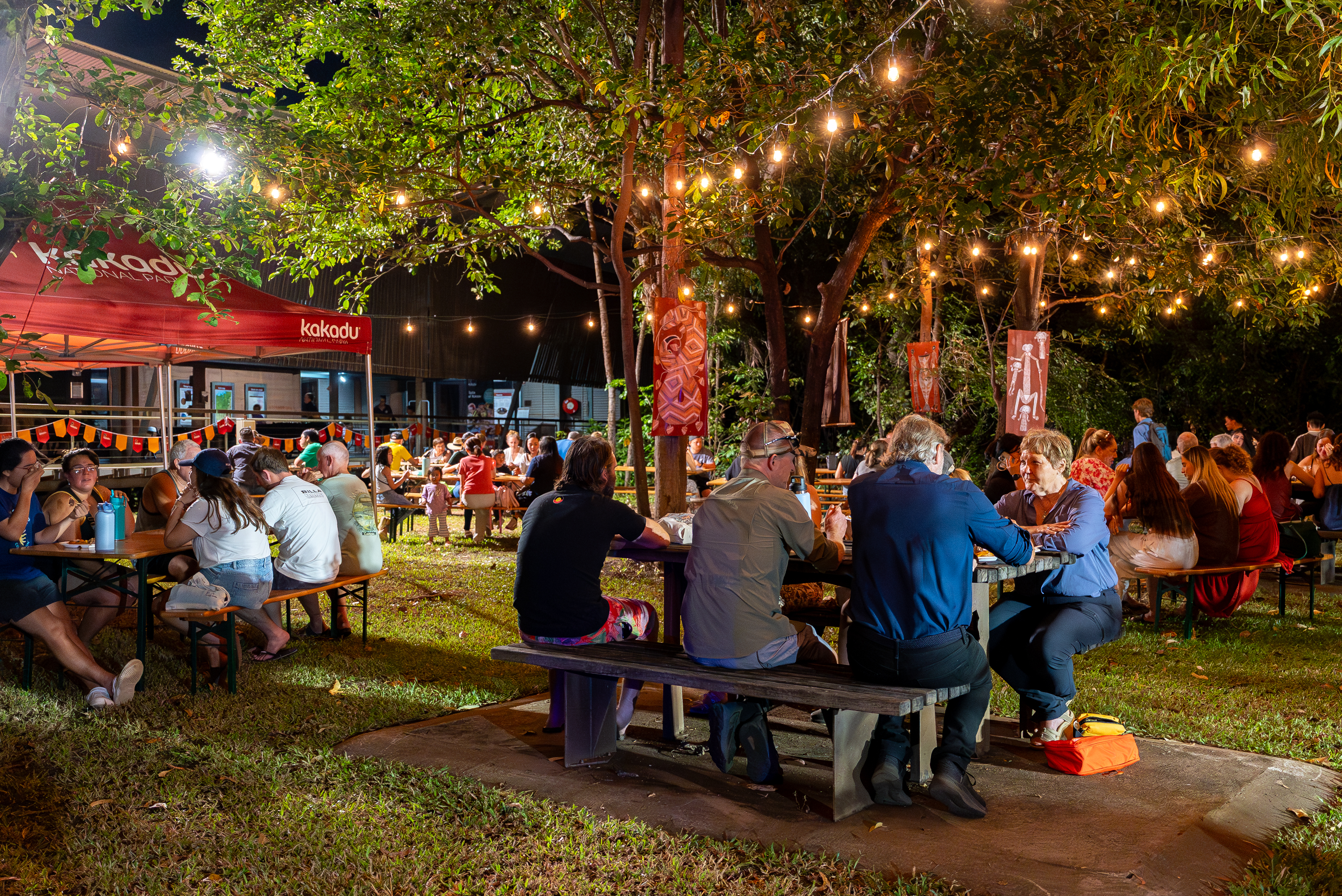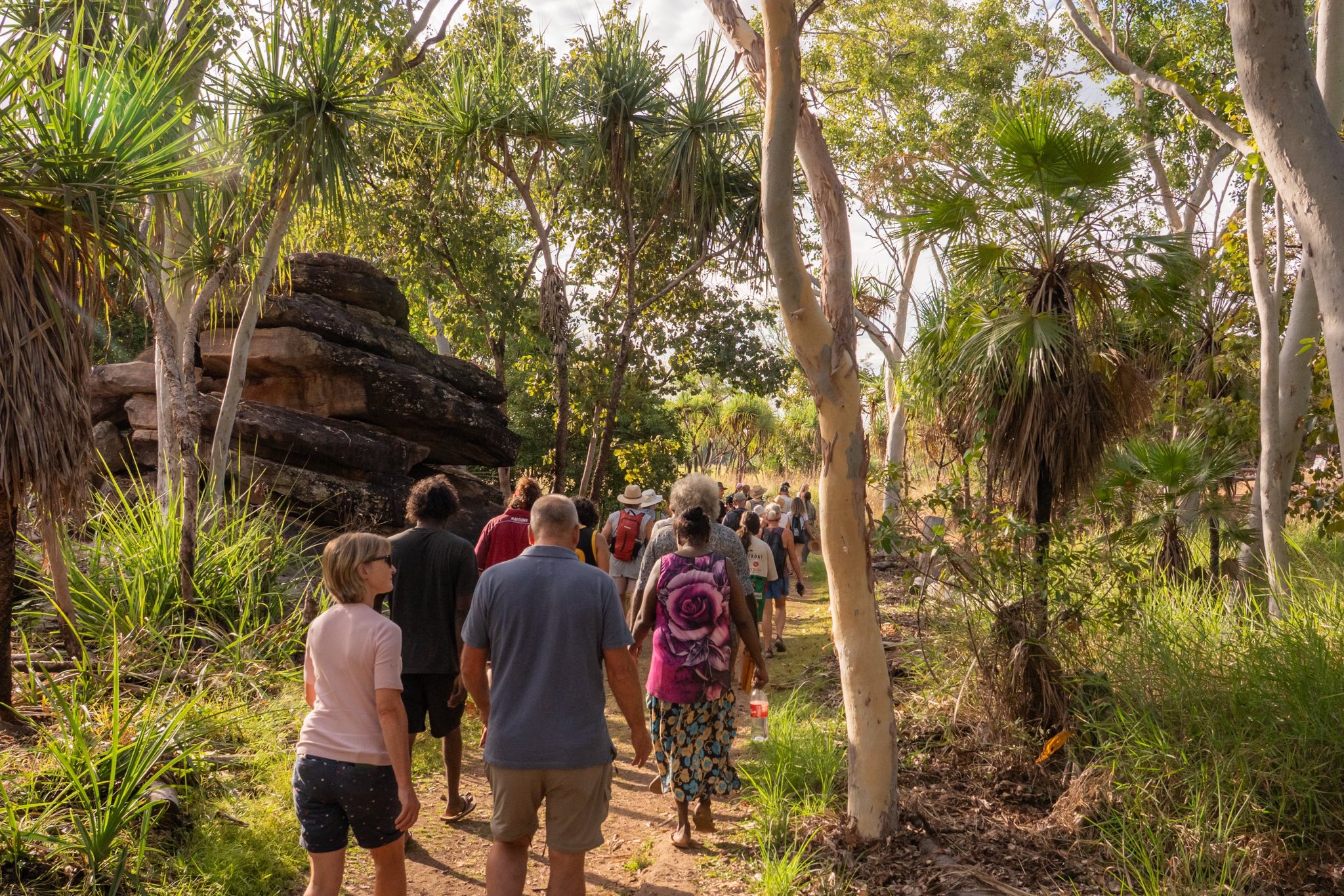There are moments when time seems to stand still. When the scent of bush herbs rising from a ground oven wraps around you like a memory. When the clap of sticks echoes across stone country. When voices rise in language, not from the past — but powerfully, defiantly, from the now.
That was Taste of Kakadu 2025 held recently on sacred lands of the Bininj/Mungguy. This wasn't just a festival; it was a heartbeat. A reclamation. A cultural invitation extended with open hands and ancient roots.
From the moment guests stepped into the Bowali Visitor Centre, on Mirarr Country, for the opening ceremony, they were welcomed not just into a space, but into a story. One carried by Traditional Owners whose voices guided the weekend, whose presence grounded every moment. Elders led the Welcome to Country, followed by traditional dancers and a communal feast prepared in the earth, just as it has been for generations.
The theme of connection rippled through every experience. At sunset, families walked the rock country of Burrungkuy and Ubirr, listening to Dreaming stories etched into stone. By mid-morning, laughter rang out from weaving circles, pandanus leaves in hand. Children painted under the guidance of artists whose brushstrokes hold millennia of knowledge.
And then came the tastes.
At Kinhkinh - Dinner Under the Stars, Bininj man and Kakadu Kitchen founder Ben Tyler joined forces with Fervor's Paul 'Yoda' Iskov to deliver more than a meal; they served stories of Country, resilience and connection.
The dishes weren't just delicious; they were deeply grounded in the land; barramundi and lilies, crocodile, wild rosella, long yam, native lemongrass and the distinct zing of Kakadu plum. Each bite was a celebration of ancient knowledge, reimagined with care.
"This dinner wasn't about fine dining. It was about truth-telling. It was about honouring our ancestors and showing our young ones that our knowledge belongs here, at the centre," Mr Tyler said.
Young people joined the dinner service, standing tall as part of the experience. Earlier that week, Clontarf boys had spent a full day immersed in culture — learning traditional fire-making with Richard Tambling, foraging for water yams with Auntie Doreen and Patsy, and fishing along Jim Jim Creek.

Throughout the weekend, TEABBA Radio broadcasted live, sharing stories and interviews with community members and leaders. The festival buzzed with activity from Cooinda Lodge, the Crocodile Hotel and Warradjan Cultural Centre, while over at Ubirr, Sunday's sunset was marked with ceremony, reflection and a deep sense of place.
Shellie Morris, joined by her sister Mandy Muir, moved hearts at the dinner with powerful songs and stories sung in language; wrapping guests in the legacy of the Yanyuwa and Wardaman peoples. The atmosphere was made even more special by the Conscious Drink served that evening, a refreshing non-alcoholic bush tonic that honoured traditional ingredients and left a lasting impression.
From traditional ground-over cooking to modern fine dining, Bininj and Mungguy people prepared tirelessly in the lead-up to the festival; foraging, harvesting and sharing their foods, knowledge and time with every guest. And it wasn't just about what was on the plate. The House of Darwin's Bush Tucker of Kakadu T-shirt was a runaway hit — a reminder that culture is carried not just in ceremony, but in what we wear, eat, and celebrate.
The weekend culminated on the lawns of Marrawuddi Arts & Culture, a closing celebration that brought together mob and visitors in shared joy. The art on display was more than decoration. Each piece was a map, a teaching, a remembrance. The giveaway of Don Namundja's painting Nhalmangiyi reminded everyone that art is survival, and that every brushstroke is a voice.
Across the festival, mob stood proud. Not as performers, but as the leaders, educators, and changemakers they've always been. From bush food stalls to cultural workshops, from didgeridoo and clapsticks to storytelling, every activity was a living testament to knowledge passed down and boldly carried forward.
For those who came with open hearts, Taste of Kakadu didn't just offer food or performance. It offered transformation. It reminded us that Country is a teacher. That culture is not a product, it is a legacy. And that when mob lead, Australia listens, learns, and is made better for it.
As the sun set over Arnhem Land and the last notes of music faded into the gum trees, the message was clear: We are still here. Still strong. Still sharing.
And always, on Country, in culture, and in truth, walking forward.


